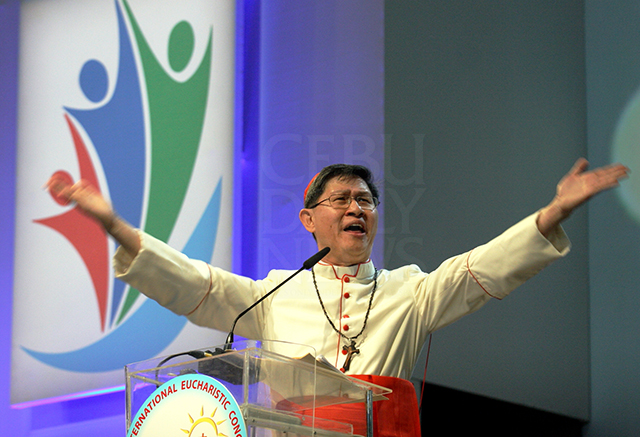
Manila Archbishop Luis Antonio Cardinal Tagle elaborates on culture and the Eucharist. (CDN PHOTO/JUNJIE MENDOZA)
DO you have real friends on Facebook?
Manila Archbishop Luis Antonio Cardinal Tagle learned a lesson about social media that he would probably never forget.
At a lecture during the ongoing International Eucharistic Congress (IEC) in Cebu City yesterday, Tagle recounted that he was approached by a woman who wanted to have a picture taken with him. She later told him that they were friends.
“I looked at her but I could not remember how we became friends. She told me we’re friends on Facebook. Looking at my reaction, I think she immediately ‘unfriended’ me,” said Tagle, drawing laughter from about 15,000 people gathered at the IEC Pavilion on Thursday morning.
“Now is that real or virtual? In a digital culture, what is real means authenticity, integrity and credibility,” he said. Tagle said real friendship is developed through time and one that can be found in Jesus.
“We look for the authentic and credible presence of Jesus,” he said. Tagle spoke on the theme “The Eucharist and the Dialogue with Cultures.”
It was his third time to speak in an IEC. His first was in 2008 in Quebec and then in Dublin in 2012.
During yesterday’s lecture, Tagle stressed the importance of culture which he said contained ways of “feelings, acting and the values of a society.”
In understanding one’s culture, he said even “space and arrangement of things” would speak much of their way of life.
“If your parish has a big space for parking but no room for pastoral formations, what does that say about the culture of your parish? Look at how we arrange people here (at the IEC Pavilion), the bishops are in front while the others are at the back. What culture is being lived out here?” said Tagle.
While there are those who “shape” the way people think, he said one should emulate Jesus who is offering a new way of living, thinking, acting and speaking.
“Jesus allowed a woman known as a public sinner to come to him. He ate with people who were never invited to a meal. Jesus is reshaping culture,” he said.
Tagle also encouraged the people to end individualism as well as the “throwaway culture.”
“Others think they can do things by themselves. There’s a culture of alienating individualism. In response to this, we propose the Eucharistic culture of convocation and communion,” he said.
When he was assigned to a parish in the 1990s, Tagle said he had the opportunity to wash the feet of a polio victim during the Mass of the Lord’s last supper on Maundy Thursday.
The event, he said, left an indelible mark on his life and ministry as a priest. “She was so happy. The walls of alienation were turned down,” he said.